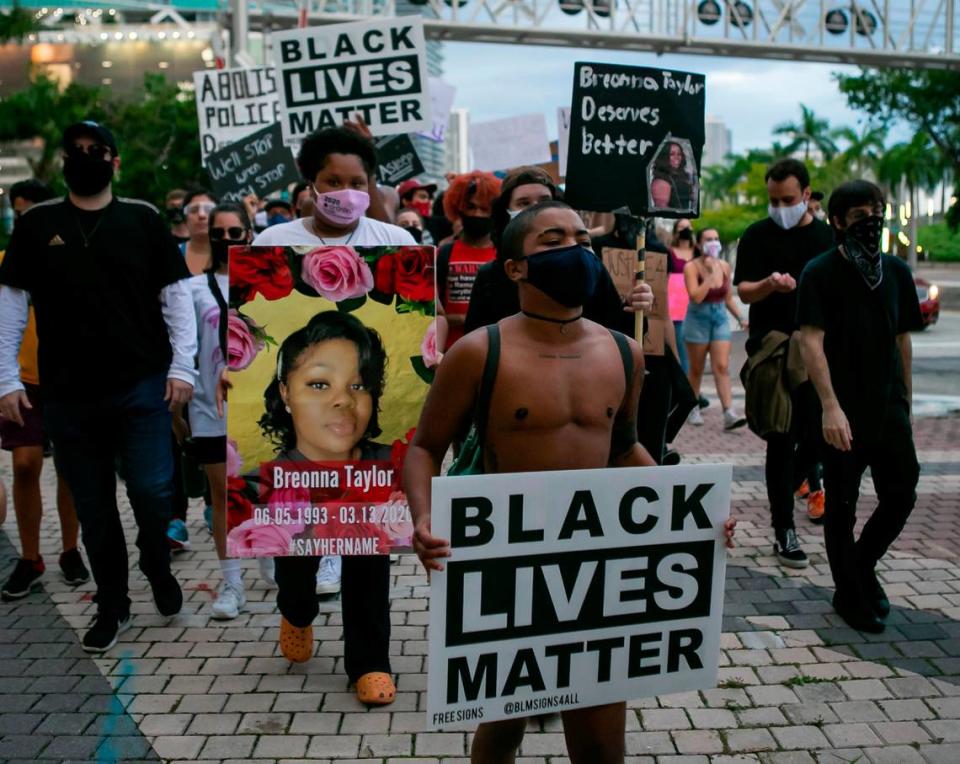‘We’re just one piece of a puzzle’: Miamians join in nationwide Breonna Taylor protests
Protesters gathered in downtown Miami Saturday to denounce the Kentucky grand jury that did not hold any officers accountable for the shooting death of Breonna Taylor, who was killed by police in a botched raid in March.
The march, organized by independent organizers and activist group The Sound Miami, was one of many demonstrations that took place across the country in recent days to protest the grand jury decision in the death of Taylor, a 26-year-old Louisville emergency medical technician. One officer was fired, and earlier this month, the city of Louisville promised reforms and paid Taylor’s family $12 million to settle a wrongful death lawsuit brought by Taylor’s mother against the city.
Earlier this week, a grand jury indicted a former Louisville police officer for “wanton endangerment” for his actions during the raid. No charges were announced against the other two officers who fired shots, and no one was charged for Taylor’s death.
The march of around 100 people was smaller than similar gatherings that took place throughout the summer, when protesters marching against police brutality shut down Interstate 95 on back-to-back days and police launched tear gas and rubber bullets to try to disperse crowds.
Protesters marched into Brickell, with police squad cars trailing behind. As they approached Brickell City Center, the security guards closed the gates as patrons watched from the walkways above.
Protesters walked past dozens of crowded restaurants and bars, where diners ate and drank at outdoor tables near the sidewalk.
“Out of the bars and into the streets,” they chanted. “While white people are dining, black people are dying.”
After nearly two hours of marching, protesters split off and went their own ways. It started to pour rain and they walked to their cars.
There were no confrontations with police, though squad cars followed closely along the protesters’ path.
“No good cops in a racist system,” they chanted. “No bad protesters in a revolution.”
“We have been here for more than 100 days, and noting Breonna Taylor every 13th of the month,” said organizer Anaya Peralta, referring to Taylor’s death on March 13. “We need justice for Breonna, but we’re just one piece of a puzzle.”
Peralta, 30, originally from Kentucky, said Taylor’s case resonated with her.
“We are going to continue to push her name,” she said.
Sage Rosenberg, who has been a constant presence at the protests this summer, said the verdict revealed, to them, “how the justice system feels about us.”
“I think it’s really telling of what our nation is prioritizing,” said Rosenberg, 22, of Miami.
The planned protest was the first in Miami since Gov. Ron DeSantis Monday announced a wide-ranging proposal aimed at creating harsher penalties for protesters. DeSantis’ proposal would create a new felony crime for property damage or injury during a protest of seven or more people, protect drivers “fleeing for safety from a mob” from liability for injuries or deaths they may cause and enact a six-month mandatory minimum sentence to anyone convicted of striking a law enforcement officer during an unlawful assembly. The proposal would also prohibit anyone charged with crimes related to such assemblies from being released on bail or bond before a first appearance before a judge.
In addition to the heightened punishment, state and local governments would also be prohibited from hiring people who have criminal records related to disorderly gatherings, and people who are already government employees who are convicted of participating in a disorderly assembly could be fired and lose their state benefits.
The proposal, called the “Combating Violence, Disorder, Looting and Law Enforcement Protection Act,” is DeSantis’ first of the 2021 legislative session.
DeSantis’ approach comes after months of protests throughout the country that have sparked a national reckoning about policing and racial inequality. The crackdown also mimics the hard-line rhetoric of President Donald Trump, whose presidential reelection campaign has held up Democrat-led cities like Chicago, Portland and Seattle as examples where protests sparked by the deaths of George Floyd and Breonna Taylor and the shooting of Jacob Blake have led to destruction.
Freddy Peralta, Ananya’s father, said he has been arrested 11 times during protests over the last four months. He said Saturday that he would not stop
“Breonna is not the only Black person killed by the police,” said Peralta, 59. “We need to build a better system. We need change. That’s why I keep coming and coming and coming and coming.”
Samantha J. Gross: @samanthajgross
Samantha J. Gross: @samanthajgross















